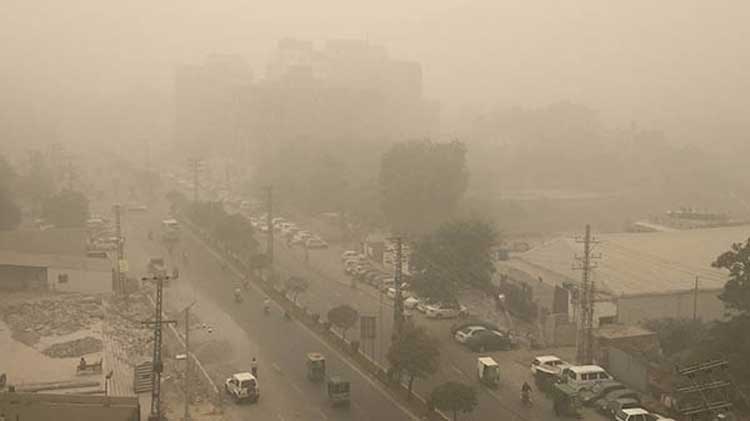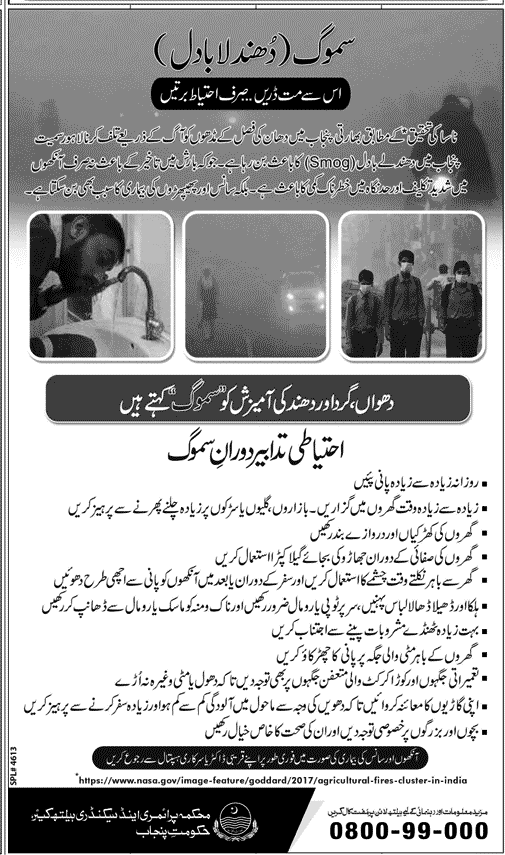Protect Yourself From Smog in Pakistan in Urdu Precautions
Every winter, cities across Pakistan, including Lahore, Karachi, and Faisalabad—turn gray under a dense blanket of toxic smog. The combination of industrial emissions, vehicle exhaust, crop burning, and stagnant weather conditions creates a choking atmosphere that affects millions. The Air Quality Index (AQI) in many areas often exceeds 400, reaching “hazardous” levels according to the World Health Organization (WHO).
Smog isn’t just an inconvenience, it’s a public health emergency. It leads to respiratory problems, eye irritation, and cardiovascular issues, especially in children, the elderly, and those with asthma. If you live in Pakistan, understanding how to protect yourself from smog isn’t optional—it’s essential.
This guide explains practical, science-backed precautions you can take to protect yourself and your loved ones from the harmful effects of smog in Pakistan.
What Is Smog?
Smog is a mix of smoke, dust, and fog, primarily formed when sunlight reacts with pollutants like nitrogen oxides and volatile organic compounds (VOCs). In Pakistan, the main sources include:
- Vehicular emissions from old or poorly maintained vehicles
- Crop residue burning in Punjab and surrounding regions
- Industrial pollution and brick kilns
- Construction dust and open waste burning

How Smog Affects Your Health
Long-term exposure to smog can lead to serious health problems. Here’s how it impacts different parts of your body:
| Body System | Common Effects | High-Risk Groups |
|---|---|---|
| Respiratory System | Coughing, asthma attacks, bronchitis | Children, elderly, asthma patients |
| Cardiovascular System | Increased risk of heart disease, high blood pressure | Heart patients, seniors |
| Eyes and Skin | Irritation, redness, dryness | Outdoor workers |
| Immune System | Reduced resistance to infections | All individuals in prolonged exposure |
According to the Pakistan Medical Association (PMA), hospital admissions for respiratory and cardiac problems increase by up to 30% during peak smog season.
Protect Yourself From Smog in Pakistan in Urdu Precautions:
How To Protect Yourself From Smog in Pakistan
Let’s go step by step through the most effective precautions you can take—at home, outdoors, and in daily routines.
1. Monitor Air Quality Daily
Before you step outside, always check the AQI in your area. You can use reliable apps or websites like:
- IQAir AirVisual
- Pakistan EPA Air Quality Monitoring Network
- AccuWeather or Google Weather
AQI Levels & What They Mean:
| AQI Level | Air Quality | Recommended Action |
|---|---|---|
| 0–50 | Good | Safe to go outdoors |
| 51–100 | Moderate | Sensitive groups should be cautious |
| 101–200 | Unhealthy for sensitive groups | Limit outdoor activity |
| 201–300 | Very Unhealthy | Avoid outdoor exposure |
| 301+ | Hazardous | Stay indoors completely |
2. Wear a Proper Mask Outdoors
A cloth or surgical mask isn’t enough. You need a mask with a high filtration efficiency, such as:
- N95 or KN95 masks (filters up to 95% of harmful particles)
- KF94 masks (Korean standard, highly effective)
Tips:
- Ensure a tight fit around your nose and mouth.
- Replace disposable masks every few days.
- Avoid reusing masks that have become moist or dirty.
3. Keep Indoor Air Clean
When outdoor air quality deteriorates, indoor pollution can still be a major problem. Here’s how you can make your home safer:
Practical Steps:
- Keep windows and doors closed during peak smog hours (early morning and evening).
- Use HEPA air purifiers in bedrooms and living areas.
- Add air-purifying plants like snake plant or peace lily (they help but don’t replace filters).
- Avoid indoor smoking or burning candles.
- Clean floors and furniture regularly with a wet cloth to capture fine dust particles.
4. Limit Outdoor Activity
Smog exposure increases with time spent outside. When AQI is high:
- Avoid morning walks or jogs (pollution levels are often highest early morning).
- Reschedule outdoor chores or workouts for cleaner air days.
- Use cars with air recirculation mode on to minimize intake of outside air.
- Wear sunglasses to reduce eye irritation.
If you must travel for work or school, keep trips short and plan routes away from heavy traffic.
5. Strengthen Your Immune System
A strong immune system helps your body cope better with air pollution.
Nutrition & Lifestyle Tips:
- Stay hydrated: Drink at least 8–10 glasses of water daily.
- Eat antioxidant-rich foods: Citrus fruits, green vegetables, almonds, and turmeric.
- Take vitamin supplements like Vitamin C, D, and Omega-3 after consulting your doctor.
- Quit smoking, as it doubles the risk of respiratory damage.
- Sleep well (7–8 hours) to allow your body to recover.
6. Protect Children and the Elderly
Children breathe faster and are more sensitive to pollutants. Similarly, the elderly and those with pre-existing conditions need extra care.
Precautions:
- Keep them indoors on high smog days.
- Use indoor play or learning alternatives.
- Ensure their medication (inhalers, etc.) is always accessible.
- Regularly consult a pediatrician or pulmonologist during the smog season.
7. Support Government and Community Efforts
Smog is not only a personal issue—it’s a collective environmental crisis. Contribute to cleaner air by:
- Reducing vehicle use (carpool, public transport, cycling on clear days).
- Reporting open garbage or crop burning to local authorities.
- Planting trees and supporting green initiatives.
- Maintaining your car’s engine to reduce emissions.
the Punjab government’s Smog Control Policy included restrictions on brick kilns and crop burning, but community cooperation remains crucial.
FAQs
Which mask is best for smog in Pakistan?
N95 or KN95 masks are most effective as they filter out 95% of PM2.5 particles. Avoid cloth or surgical masks, they provide little protection against smog.
Can air purifiers help during smog season?
Yes, HEPA air purifiers significantly reduce indoor air pollution levels and are highly recommended during smog season in cities like Lahore or Islamabad.
What time of day is smog worst in Pakistan?
Smog levels peak in the early morning (6–9 AM) and late evening (6–10 PM) due to temperature inversion and traffic emissions.
Is it safe to exercise outdoors during smog season?
No, avoid outdoor exercise when AQI exceeds 150. Choose indoor workouts or gyms with filtered air instead.
Does rain help reduce smog?
Yes, rainfall naturally cleans the air by removing particulate matter, providing short-term relief from smog.
Smog in Pakistan may be seasonal, but its effects can last a lifetime. Protecting yourself isn’t complicated—it’s about being proactive and consistent. By checking AQI, using the right masks, purifying your indoor air, and making healthy lifestyle choices, you can significantly reduce your exposure.
Remember, every small action, from carpooling to planting trees, adds up. Protect yourself, educate others, and be part of the collective effort for a cleaner, healthier Pakistan.

